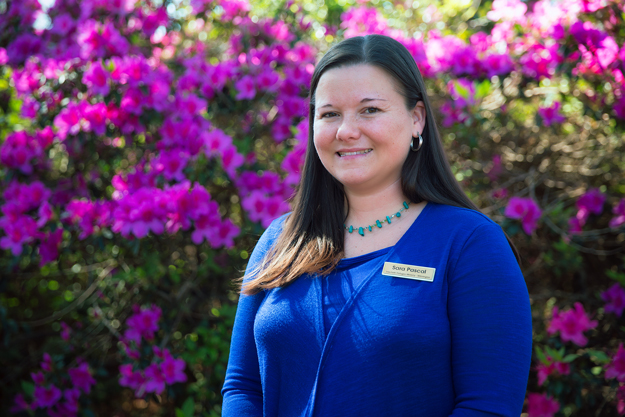Giving Refuge
Sara Pascal runs the local refugee resettlement office and its uncertain future

In recent years, the Wilmington area has built a reputation as a welcoming community, a destination for retirees and younger families who appreciate the region’s amenities.
The community has also welcomed a steady stream of refugees, resettled here through a lengthy process that begins with the U.S. State Department. According to SARA PASCAL, coordinator of the Interfaith Refugee Ministry’s Wilmington office, Wilmington is now home to 555 people who formerly lived a precarious existence for decades in Asian, African, or Latin American refugee camps.
“Outcomes in Wilmington are good,” Pascal says. “There is lots of community support from the university, from volunteers, and from churches.”
In fact, she adds, her agency – the local center for refugee resettlement – now has more capacity than it has refugees. That’s largely in part because of recent efforts at the federal level to limit the number of refugees coming to the U.S.
“The two executive orders (signed by President Donald Trump, but currently stayed by federal judges) directly target U.S. refugee admissions, and they would stop the refugee program for 120 days,” she says, explaining that impending implementation of either executive order means that the local Interfaith Refugee Ministry office is operating on a week-by-week basis rather than being able to plan ahead.
If enacted, the executive orders would lower the maximum number of refugees admitted to the U.S. each year from 110,000 to 50,000. More than 38,000 have already come to the U.S. this year, so that new limit would mean the U.S. would take only 12,000 more refugees during the 2017 fiscal year.
The new directives would also pose a major challenge to the office’s budget.
“Agencies are funded per capita. Fewer refugees mean fewer dollars for us, so we have an increased need for local (financial) support,” Pascal says.
In her job administering programs for the New Bern-based Interfaith Refugee Ministry, Pascal is continuing a career focused on making refugees feel at home in a new land.
After training with the Peace Corps as a new college graduate, she spent time in Bangkok, Thailand teaching preschoolers and working in the community. Returning to her native North Dakota, she continued as an early childhood teacher and also taught English for Speakers of Other Languages (ESOL). That experience gave her a firsthand look at challenges encountered by refugees as they adjust.
“The children were getting a good education, but their families struggled to find affordable housing and jobs,” Pascal says.
To prepare for her career, Pascal next completed a master’s degree in social work at Tulane University, which has a special global social work track. While in school, she interned with the director of a Baton Rouge refugee agency, who also coordinated Louisiana’s refugee program.
With this broad exposure as a foundation, Pascal took a job as an intensive case manager with Lutheran Social Services in Phoenix, Arizona.
“It was a wonderful opportunity,” she says. “I worked with families that had a lot of barriers, including medical and mental health cases. I could see the progress the families made. The best part is these refugees are so resilient. With a little help, they thrive.”
The size of Phoenix, however, proved a bit daunting for Pascal and her husband, a refugee from Burundi whom she met in North Dakota. Looking for a smaller city, Pascal saw an opening with Interfaith Refugee Ministry in Wilmington and got the job. The couple moved here in 2013, their arrival providing a twofer for the office, since Pascal’s husband volunteers for the agency, drawing on his linguistic skills and his personal experience as a refugee to help put newcomers at ease.
Most recently, the Democratic Republic of Congo and neighboring Rwanda have been the source of most Wilmington-bound refugees, Pascal says. These individuals, often with both Rwandan and Congolese roots, are welcome in neither country because of their tribal identity. Wilmington is also home to a large number of Karen people, a persecuted ethnic group in Burma.
Other refugees in the area come from various Central and South American countries as well as from Iraq.
Their journey to a new home, such as Wilmington, depends first on getting a “refugee” designation by the United Nations, which qualifies them for vetting by any of a number of countries who take in refugees. If they are destined for the U.S., the State Department performs background checks and interviews, according to Pascal. Those who pass that step are referred to one of nine national agencies with which the State Department has contracts. Episcopal Migration Ministries, Interfaith Refugee Ministry’s umbrella organization, is one of those agencies. It assigns refugees to communities that have the capacity to resettle them, helping them enroll in school, find housing and jobs, learn English, and gradually become self-sufficient over a multi-month time period.
Interfaith Refugee Ministry Wilmington is ramping up its awareness-building and fundraising efforts. It will host a multi-cultural celebration of World Refugee Day on June 24 at the Wilmington Family YMCA, 2710 Market Street. Activities include a soccer tournament and food tasting, and the public is invited. Info: helpingrefugees.org